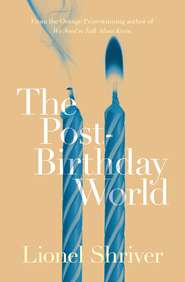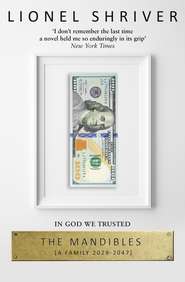По всем вопросам обращайтесь на: info@litportal.ru
(©) 2003-2024.
✖
Big Brother
Автор
Год написания книги
2019
Настройки чтения
Размер шрифта
Высота строк
Поля
“You have other responsibilities. To Tanner, to Cody, to me. Even”—a loaded pause—“to Baby Moronic. You can’t make a decision like this by fiat.”
“Slack sounded at his wit’s end. I had to say something.”
“What you had to say,” said Fletcher levelly, “was, ‘I’m sorry, but I have to ask my husband.’”
“Maybe I knew what you’d say.”
“And what was that?”
I smiled, a little. “Something like, ‘Over my dead body.’”
He smiled, a little. “Got that right.”
“I realize it didn’t go that well. The last visit.”
“No. It didn’t.”
“You seemed to get on the wrong side of each other.”
“There was no ‘seeming.’ We did.”
“If it were just anybody, I wouldn’t ask. But it isn’t. It would mean so much to me if you tried a little harder.”
“Got nothing to do with trying. You like someone, or you don’t. If you’re ‘trying,’ you don’t.”
“You can give folks a break. You do that with other people.” I took a moment to reflect that in Fletcher’s case this wasn’t always true. He could be harsh.
“Are you telling me that throughout this negotiation you never talked to your brother directly? So his friend is trying to offload the guy behind his back.”
“Maybe Edison’s embarrassed. He wouldn’t like asking favors of his little sister.”
“Little sister! You’re forty years old.”
An only child, Fletcher didn’t understand about siblings—how set that differential is. “Sweetheart, I’ll still be Edison’s little sister when I’m ninety-five.”
Fletcher soaked the rice pan in the sink. “You’ve got some money now, right? Though I’m never too clear on how much.” (No, he wouldn’t have been clear. I was secretive.) “So send him a check. Enough for a deposit on some dump and a couple of months’ rent. Problem solved.”
“Buy him off. Bribe him to stay away from us.”
“Well, he wouldn’t have much of a life here. You can’t say Iowa has a ‘jazz scene.’”
“There are venues in Iowa City.”
“Pass-the-hat gigs for a handful of cheapo students aren’t going to suit Mr. Important International Jazz Pianist.”
“But according to Slack, Edison isn’t—‘in the best form.’ He says Edison needs—‘someone to take care of him.’ He thinks my brother’s confidence has taken a knock.”
“Best news I’ve heard all day.”
“My business is doing well,” I said quietly. “That should be good for something. For being generous.” The way I’ve been generous with you, I almost added, and with kids who are now my children too, but I didn’t want to rub it in.
“But you’re also volunteering the rest of this family’s generosity.”
“I realize that.”
Fletcher leaned on either side of the sink. “I’m sorry if I seem unfeeling. Whether or not the guy gets on my nerves, he’s your brother, and you must find it upsetting, his being down on his luck.”
“Yes, very,” I said gratefully. “He’s always been the hot shot. Being strapped, straining his friends’ hospitality—it feels wrong. Like the universe has turned on its head.” I wasn’t about to tell Fletcher, but Edison and Slack must have fallen out, since the saxophonist’s urgency had been laced with what I could only call, well—disgust.
“But even if we did decide to take him in,” said Fletcher, “and we haven’t—the visit couldn’t be open-ended.”
“It can’t be conditional, either.” If I was going to think that way, and I preferred not to, I had amassed, as of the previous couple of years, most of the power in our household. I disliked having power, and in ordinary circumstances rather hoped that if I never exercised this baffling clout it would go away. For once, however, the novel agency was useful. “Saying, ‘only for three days,’” I said, “or ‘only for a week.’ That doesn’t sound gracious, but as if we can only stand his company for a limited period of time.”
“Isn’t that the truth?” Fletcher said curtly, leaving the dishes to me. “I’m going for a ride.”
Of course he was going for a ride. He rode his bicycle for hours almost every day—or one of his bicycles, since he had four, competing with unsold coffee tables for limited space in a basement that had looked so cavernous when we moved in. Neither of us ever mentioned it, but I’d bought him those bikes. Technically, we pooled our resources. But when one party contributes the contents of an eyedropper and the other Lake Michigan, “pooling” doesn’t seem the right word, quite.
Ever since my husband had started cycling obsessively, I wouldn’t go near my own ten-speed clunker, by then gathering dust with deflated tires. The neglect was of my choosing, but didn’t feel that way. It was as if he’d stolen my bike. Were I ever to have dragged the thing upstairs, greased the chain, and wended down the road, slowly and not very far, he’d have made fun of me. I preferred to skip it.
Every time Fletcher went for a ride I got annoyed. How could he stand the boredom? He’d come home some afternoons in a state of brisk satisfaction that his time had improved, usually by a few seconds. Churning the same route through the cornfields to the river a smidgeon faster was of no earthly consequence to anyone. He was forty-six, and soon the computer on his handlebars would simply track his disappointment in himself. I didn’t like to think that I begrudged him something all his own, but he had the furniture making, which was private enough. He used those rides to shut me out.
I felt so guilty about this annoyance that I went to lengths to disguise it, forcing myself to suggest he go for a ride in order, say, to get out of his system some frustration with Tanner, “since it makes you feel so much better.” But a too-lilting falsetto gave my falsity away. Most confounding: he liked that the cycling annoyed me.
Clearly, I was a bad wife. Aerobic jaunts would lengthen his life. After Cleo, his ex, went so bizarrely off the deep end, Fletcher had grown ever more consumed with control, and as obsessions went the cycling was harmless. Between exercise and his stringent diet, my husband had lost the tiny roll at his middle for which my own mashed potatoes and muffins had been to blame. Yet I’d cherished that little roll, which had softened him in a larger sense. By soliciting forgiveness, the gentle excess had seemed also to dispense it.
I required that forgiveness in some quantity. During the previous three years I must have put on about twenty pounds (I was loath to stand on a scale and confront an exact number). When running Breadbasket I’d been pretty thin. In the catering trade, food has a way of becoming repulsive; a vat of cream cheese is indistinguishable from a batch of plaster. But in my subsequent endeavor, the Mexicans on my staff were forever bringing trays of tamales and enchiladas into work. I’d cooked on my feet; now I sat in my office. Thus I’d come to squander an appalling proportion of my mental time on empty vows to cut down to one meal a day, or on fruitless self-castigation over a second stuffed pepper at lunch. Surely on some unconscious, high-frequency level other people could hear the squeal of this humiliating hamster wheel in my head, a piercing shrill that emitted from every other woman I passed in the aisles of Hy-Vee.
It wasn’t fair, but I blamed Fletcher for those twenty pounds. I may have been a quiet sort who hugged the sidelines, but that didn’t mean I was a pushover. I was the kind of person at whom you could finger-wag and tut-tut-tut, who wouldn’t talk back, who would submit to all manner of browbeating while seeming to take it all in like a good little camper, and you’d walk away and think, There, that’s put her straight, and then I’d sift off and blithely do whatever you’d just told me not to.
That defiant streak had backfired when I started noshing pointedly between meals on whatever entire food group Fletcher had recently disavowed. (The repudiation of cheese was deadly. The day after that announcement, I returned from the supermarket with half a wheel of Brie.) His spurning of the very dishes that had entranced him during our courtship and early marriage—banana cream pie, homemade deep-dish pizza—hurt my feelings. I shouldn’t have conflated love and food, but that’s a mistake women have made for centuries, so why should I be any different? I missed cooking, too, which I found therapeutic. Hence I still baked an occasional coconut layer cake, which Fletcher would boycott, and even the kids would avoid as their father glowered nearby. Well, someone had to eat that cake. Fatally, I felt sorry for it.
We had at least evolved a ritual compromise. From each contraband confection, I cut a one-bite amuse-bouche, arranging it with a dab of whipped cream, a garnish of mint, and a couple of pristine fresh raspberries on a large china dessert plate with a sparkling silver fork. This I would leave in the middle of our prep island, the way kids put out cookies for Santa, then make myself scarce. Fletcher would never take the bait while I was watching; still, it meant more to me than I can say that these illicit samplers of what he now deemed “toxic” vanished within the hour.
Strictly speaking, as a nutritional Nazi my husband had grown more attractive, but I’d been attracted to him before. Besides, a pointiness was now more pronounced. He had a high forehead and long oval face; shorn to a prickly furze to minimize the balding, his head was bullet-shaped. His long, strong nose in profile looked like a checkmark, and the wire-rimmed glasses added a professorial sharpness. Some strict, censorious quality had entered the triangular geometry of his wide shoulders and newly narrow waist, so that simply being in his physical presence made me feel chided.
As I collected our dishes, it bothered me that Fletcher hadn’t stayed to tidy the kitchen, which wasn’t like him. Commonly we dispatched cleanup with the interlocking fluidity of synchronized swimmers. We were at our best working side by side—neither of us understood or relished “leisure” time—and my fondest memories were of just this sort of cleanup on a grand scale. When we first started dating, on nights I’d catered a big buffet Fletcher would install Tanner and Cody in sleeping bags on my living room floor, so he could help with the kitchen. (When I first saw him shake his hands at the sink—thrusting fingers downward splat-splat, a small, instinctive motion that ensures you don’t dribble water all over the floor on the way to drying your hands on the dishtowel—I knew this was the man I would marry.) Swabbing counters, sealing leftovers, and rinsing massive mixing bowls, he never complained; he never had to be told what to do. He only took breaks to sidle behind me as I removed another set of warm tumblers from the dishwasher and kiss my neck. Believe it or not, those cleanups in spattered aprons were romantic, better than champagne and candlelight.
Such memories in mind, I could hardly begrudge sudsing the broccoli steamer after lunch for two. I reviewed our conversation. It could have gone worse. Fletcher might himself have announced “over my dead body”; I’d slyly said it for him. I’d never asked outright, “Is it okay if my brother stays in our house for a while?” He’d never said yes or no.
Our house. Of course, it was our house.
Having rented most of my life, I still hadn’t shaken the impression that this address on Solomon Drive belonged to someone else; I kept the place fanatically neat as if the real owners might walk in any time unannounced. The house was larger than we required; the kitchen’s plenitude of cabinets invited the purchase of pasta- and bread-making machines that we’d use once. Deserving of the contemptuous tag McMansion, our new home had been an overreaction to the cramp of Fletcher’s tract rental, one of those “temporary” resorts men seek post-divorce, from which unless a new woman puts her foot down they never move. I’d been flushed with awe that I could suddenly afford to buy a house, in cash no less, and in some ways I bought it simply because I could.
Also, I’d wanted to find Fletcher a workspace. Furniture was his passion, so I bought his passion for him. Naïve in the ways of money, I couldn’t have known beforehand how much he would resent me for it.
Earlier in our marriage, Fletcher had worked for an agricultural company that made genetically modified seed. I’d been keen to enable him to quit because he wasn’t a natural salesman—not from environmentalist aversion to fiddling with nature, or political outrage that corporate America wanted to patent what was once literally for the picking. I didn’t hold many opinions. I didn’t see the point of them. If I opposed the production of nongerminating disease-resistant corn, it would still be sold. I considered most convictions entertainment, their cultivation a vanity, which is why I rarely read the newspaper. My knowing about an assassination in Lebanon wouldn’t bring the victim to life, and given that news primarily aggravated one’s sense of helplessness I was surprised it was so widely heeded. Refusal to forge views for social consumption made me dull, but I loved being dull. Being of no earthly interest to anyone had been a lifelong goal.
In kind, this brick neocolonial had no character. It was newly built, its maple floors unscarred. I adored its unstoried blankness. The sockets were solidly wired, and everything worked. I’d never courted character on my own account, save in the sense of being disinclined to shoplift or cheat on my husband; Edison was the one who sought the designation “a real character,” and he could have it. I gloried in anonymity and by then violently resented that the glare of an uninvited public spotlight had turned me into someone in particular for other people. (For pity’s sake, you’d think after purposefully burying myself in the very middle of the country the least I could expect was to be inconspicuous.) I had enough history, and with the lone exception of Edison himself my instinct regarding the past was to draw the shade.











